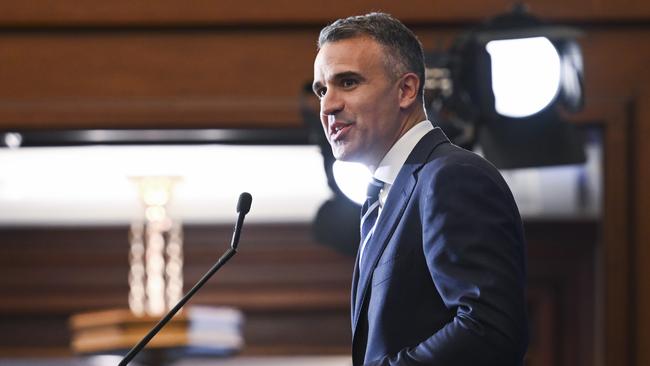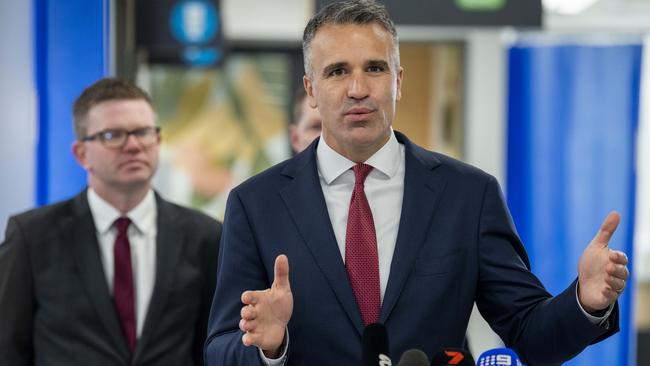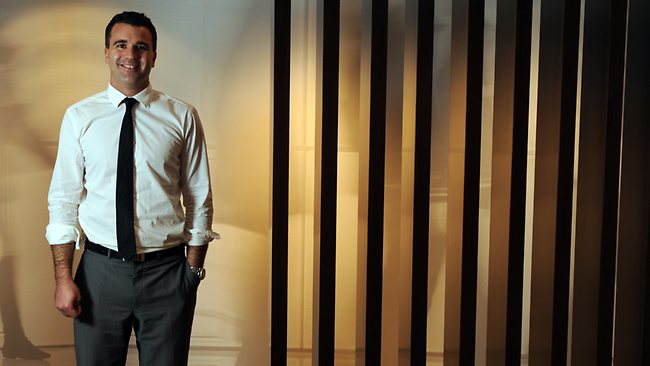Premier Peter Malinauskas unveils laws to ban political donations – with tough penalties
“World-leading” laws to ban political donations and gifts would not stop unions and businesses from funding their own campaigns, Premier Peter Malinauskas concedes.
State Election
Don't miss out on the headlines from State Election. Followed categories will be added to My News.
Unions, businesses and other interest groups would be free to fund their own partisan campaigns under proposed laws banning political donations and gifts, Premier Peter Malinauskas concedes.
Insisting he wants to bar so-called third-party campaigns under donation reforms he is touting as world leading, Mr Malinauskas on Thursday argued this would be unlikely to withstand legal challenges relating to free speech.
Donations and gifts to political parties, MPs and candidates would be banned under the proposed laws, which Mr Malinauskas unveiled on Wednesday night.
Prison terms and hefty fines would be imposed for breaches of the legislation, which aims to deliver on an election vow.
Asked by The Advertiser if he wanted to prevent business or union-funded campaigns like the ambulance union’s 2022 election blitz on ramping, Mr Malinauskas said he did but declared this entered into “legally difficult territory”.

He said the bill sought to change the opt-in regime for public political funding, taking a major party spending cap from about $5m to $4m. This would cost taxpayers $2.922m during financial year 2024/25.
“The principle we’re seeking to honour here … is to remove the practice of politicians spending an inordinate amount of time fundraising, over and above doing their job – the job that people elect them to do,” Mr Malinauskas said at a press conference on Thursday morning.
Declaring he wanted “money out of politics”, Mr Malinauskas on Wednesday night insisted South Australia was “on the cusp of becoming a world leader in ending the nexus between money and political power”.
The Electoral (Accountability and Integrity) Amendment Bill 2024 outlaws the giving and receiving of electoral donations and gifts to registered political parties, members of parliament and candidates.
Loans, other than from a financial institution, also would be prohibited. Breaches risk a fine of up to $50,000 or up to 10 years jail.
In a bid to ensure new parties and candidates are not disadvantaged, they would be entitled to get donations of up to $2700 and also subjected to a spending cap.
Mr Malinauskas painted the donation ban as another first in SA’s “rich tradition of leading the world in democratic reform” but warned it might face a High Court challenge.
“We want money out of politics. We know this is not easy. These reforms may well face legal challenge,” he said.

“But we are determined to deliver them, with this bill to be introduced in the parliament in the near future.”
The Bill proposes a restructure and mandatory application of SA’s public funding model, including a reduction in spending by parties, MPs and candidates. But it proposes increasing public funding before election campaigns, including a series of partial advance payments.
SA now has two forms of public funding: for registered political parties for reimbursement of administrative expenditure and capped election funding.
For example, a registered political party is given a notional cap of $75,000 for each lower house district in which it endorses a candidate.
Deputy Opposition Leader John Gardner said the Liberals were concerned about “the risk of Americanising our elections”, with significant amounts of money pumped into external groups funding political advertising without any serious regulation.
He questioned how Mr Malinauskas would address the risk of money being transferred to unions and other lobby groups running political campaigns separate to regulation on political parties.
“There’s a risk of unregulated third-party campaigns from unions and lobby groups and American-style super PACs (political action committees) being accentuated and I think that would be a bad outcome that doesn’t achieve the Premier’s aims,” Mr Gardner said.
“The Premier has said he’s in favour of transparency and fairness, so we’ll happily have these conversations with him and I’m sure, if he’s fair dinkum about this, he’ll take those concerns seriously and we’ll have those conversations in good faith.”
SA Greens co-leader Robert Simms said his party had “long rallied against the corrosive influence of donations on our democracy” but warned “the devil will be in the detail here”.
He said the Bill required careful examination before the Greens could form a position.
In an election promise two months ahead of the 2022 poll, Mr Malinauskas vowed Labor would outlaw donations from unions, businesses and others bankrolling state political parties.
Mr Malinauskas, who first publicly urged a donations ban in 2012 when he headed the powerful shop assistants’ union, said the election promise was the one measure that would improve public confidence in institutions.
More Coverage
Read related topics:Peter Malinauskas






